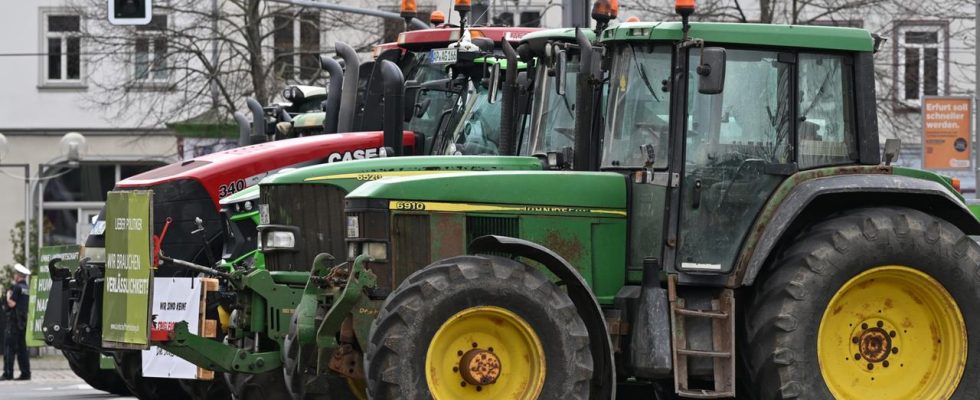The farmers’ protests are apparently having an effect: the German agriculture ministers want to streamline bureaucratic rules for farmers. The EU also decided to significantly weaken environmental regulations.
After the farmers’ protests, the federal and state agriculture ministers agreed to curb the chaos of regulations for agriculture and forestry in Germany. The bureaucratic effort for farmers should be reduced and the first steps will be implemented by mid-2024, said the chairwoman of the Conference of Agriculture Ministers, Thuringia’s department head Susanna Karawanskij, in Erfurt. A schedule for this has been agreed with Federal Agriculture Minister Cem Özdemir (Greens). “We should move forward quickly,” said Özdemir. “Some things are already on the way.”
Among other things, it is about abolishing multiple documentation requirements or contradictory regulations due to EU and federal requirements. According to Karawanskij, the federal states have put a total of 194 proposals on the table, which the federal government is now examining and for which it is drawing up a list of priorities. In addition, it is expected that new laws will not create new “bureaucratic monsters”.
Demands of the farmers’ association met
Before the meeting, the German Farmers’ Association had called for a reduction in bureaucracy. “Our companies are overwhelmed by bureaucracy. This effort costs an immense amount of time and therefore money,” criticized association president Joachim Rukwied. On the sidelines of the conference, farmers pointed out that there are different requirements in different laws when it comes to distance regulations for water protection, for example.
The agriculture ministers of the federal states criticized what they considered to be insufficient financing for the restructuring of animal husbandry to improve animal welfare. “We are concerned with long-term, reliable financing,” said Karawanskij. Özdemir pointed out that a total of one billion euros has so far been made available for changes in pig farming. “This can only be a beginning,” replied Brandenburg’s Agriculture Minister Axel Vogel.
EU weakens environmental regulations
In view of the massive farmers’ protests in many member states, the EU Commission is significantly weakening environmental regulations for agriculture – in some cases retroactively for this year. This means that the obligation to set aside land should be eliminated entirely. Small farms under ten hectares should no longer be checked to see whether they actually comply with environmental regulations.
The EU’s Common Agricultural Policy (CAP) currently requires farmers to leave four percent of their agricultural land fallow. This is intended to create areas for species protection. The Commission suspended the regulation as a result of Russia’s war of aggression against Ukraine, originally to secure food supplies. This will now largely be converted into an incentive system from 2024: “Farmers will be encouraged to set aside land, but without loss of income,” explained the commission.
Other regulations should also be applied less strictly. The crop rotation change that has been mandatory since the beginning of this year on 35 percent of the arable land is to be replaced by a “variation” of crops. EU Agriculture Commissioner Janusz Wojciechowski said that member states will be able to interpret the rules “according to regional circumstances” in the future.
Criticism from environmentalists
Environmentalists criticized the plans. “Instead of advocating for an ecological and social agricultural transition, the EU Commission is bowing to the agricultural industry,” explained Sascha Müller-Kraenner from German Environmental Aid. “With more flat-rate direct payments and no money for fallow land, retreat areas and species-rich meadows and pastures, it is driving climate and species protection in agriculture towards the wall at full speed.”
“The path that the EU Commission wants to take leads (…) past the target,” explained the agricultural policy spokeswoman for the Green parliamentary group, Renate Künast. The proposals are “completely contradictory” and a reduction in environmental standards is unacceptable.
Wolfgang Hentschel, MDR, tagesschau, March 15, 2024 7:01 p.m

